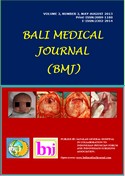ELEVATION OF SERUM C-REACTIVE PROTEIN AS A PREDICTOR FOR SYSTEMIC INFLAMMATORY RESPONSE SYNDROME IN CERVICAL SPINAL CORD INJURY PATIENTS
Abstract
Objectives: Spinal cord injury has been an important medical issue with high incidence, complications, and mortality rate. For the past 2 decades, there have been a number of researches about the role of inflammatory mediators in trauma patients. However, up to now, there were limited references about the role of CRP as a predictor of SIRS in cervical spinal cord injury. Methods: This was an analytical prospective cohort study of 28 patients to determine the role of increase CRP serum as a predictor for SIRS in cervical spinal cord injury in Sanglah General Hospital, Bali-Indonesia. The data were descriptively analyzed by applying univariate and multivariate analysis to determine the role of increase CRP serum with SIRS in cervical spinal cord injury. Results were considered significant if p < 0.05. Results: From 28 samples collected, 18 samples (64.28%) were male, 12 samples were in >50 years old age group (42,86%), and the most frequent spinal cord injury scale was ASIA A (12 samples, 42,86%). Both univariate and multivariate analysis showed that increased serum CRP and ASIA Score were significant predictors of SIRS in cervical spinal cord injury patients. Conclusion: Increase in serum CRP value can be used as a reliable predictor for SIRS in cervical spinal cord injury patients.


